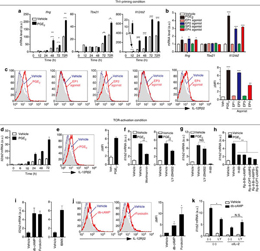Research Abstract
プロスタグランジンE2は、サイクリックAMPとPI3キナーゼによりインターロイキン12シグナルを相乗的に増幅してTh1細胞分化を促進する
プロスタグランジンE2(PGE2)によるcAMPシグナル伝達の活性化は、T細胞受容体活性化とTh1細胞分化を抑制すると長い間考えられてきた。本研究で、Yaoたちは、PGE2によるcAMP経路とPI3キナーゼ経路の二重刺激で、IL-12シグナル伝達とIFN-γシグナル伝達が増幅されてTh1細胞分化が相乗的に促進されることを明らかにした。
Prostaglandin E2 promotes Th1 differentiation via synergistic amplification of IL-12 signalling by cAMP and PI3-kinase
2013年4月9日 Nature Communications 4 : 1685 doi: 10.1038/ncomms2684

1型ヘルパーT細胞(Th1細胞)はさまざまな自己免疫疾患や炎症性疾患に重要な役割を果たしている。サイクリックAMP(cAMP)は、インターフェロン-γ(IFN-γ)産生を抑えTh1細胞による免疫炎症を抑制すると、長い間信じられてきた。今回我々は、cAMPがTh1細胞の分化に関与するサイトカイン受容体遺伝子の発現を誘導することにより、Th1分化を促進することを明らかにした。すなわち、PGE2(プロスタグランジンE2)はEP2/EP4受容体を介してcAMP-PKAシグナルを動かし、これがCREBとそのコアクチベーターCRTC2を活性化してIL-12の受容体であるIL-12Rβ2とIFN-γの受容体であるIFN-γR1の転写を促進する。一方、これまで知られていたcAMPによるT細胞受容体情報伝達の抑制は、EP2/EP4やCD28がPI3-キナーゼが同時に活性化することにより相殺される。実際、マウス個体でT細胞のEP4を欠損させるとIL-12Rβ2とIFN-γR1の発現が抑制され、Th1細胞による炎症が抑制された。これらの知見から、cAMPによるTh1細胞分化の分子機構と病気との関連が明らかになり、cAMP調節因子の免疫調節薬としての開発の臨床や治療上の意義が示された。
Chengcan Yao1,2*, 平田 多佳子1,2, Kitipong Soontrapa1, Xiaojun Ma1, 竹森 洋3 & 成宮 周1,2
- 京都大学大学院医学研究科 神経・細胞薬理学教室
- 独立行政法人 科学技術振興機構(JST)CREST
- 独立行政法人 医薬基盤研究所 代謝疾患関連タンパク探索プロジェクト
*現所属先: エディンバラ大学 Queen’s Medical Research Institute(英国)
T helper 1 (Th1) cells have critical roles in various autoimmune and proinflammatory diseases. cAMP has long been believed to act as a suppressor of IFN-γ production and Th1 cell-mediated immune inflammation. Here we show that cAMP actively promotes Th1 differentiation by inducing gene expression of cytokine receptors involved in this process. PGE2 signalling through EP2/EP4 receptors mobilizes the cAMP-PKA pathway, which induces CREB- and its co-activator CRTC2-mediated transcription of IL-12Rβ2 and IFN-γR1. Meanwhile, cAMP-mediated suppression of T-cell receptor signalling is overcome by simultaneous activation of PI3-kinase through EP2/EP4 and/or CD28. Loss of EP4 in T cells restricts expression of IL-12Rβ2 and IFN-γR1, and attenuates Th1 cell-mediated inflammation in vivo. These findings clarify the molecular mechanisms and pathological contexts of cAMP-mediated Th1 differentiation and have clinical and therapeutic implications for deployment of cAMP modulators as immunoregulatory drugs.

